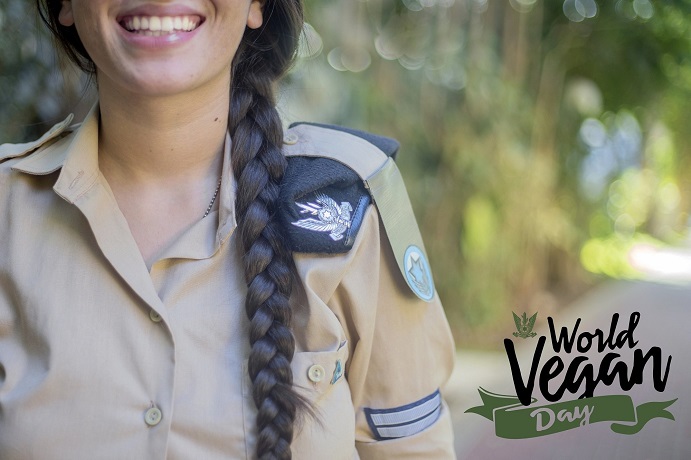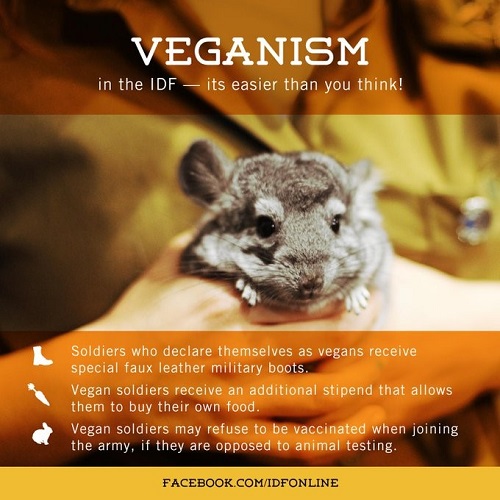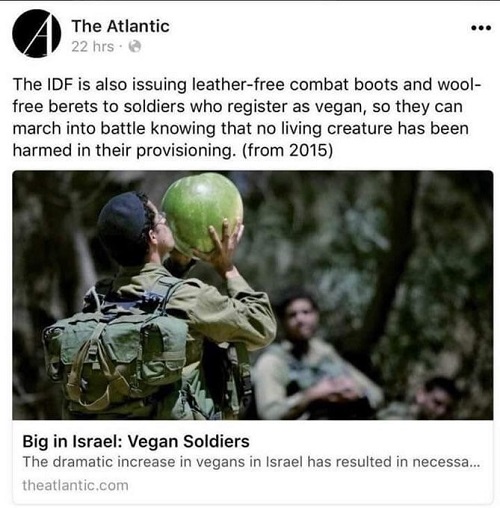
Sara Doyel
Mondoweiss / September 9, 2019
Gleaming produce spills out of market baskets. An outstretched palm offers fresh herbs, an organic farm in the background. A table overflowing with a rainbow of dishes cuts away to a morsel of hot bread diving into a bowl of tahini and olive oil. Young, attractive faces smile at the camera while baby animals frolic in the background. If you’re vegan, Israel looks like paradise. At least, that’s what Vibe Israel and its partners at the Israel Brand Alliance want you to think. Their Vibe Vegan tour for food bloggers is just one small element of Israel’s government-sponsored veganwashing campaign, which aims to replace reports of its vicious human rights abuses with the peace-loving compassion usually associated with veganism and thereby repair its image on the global stage. Make no mistake: Israel is using veganism as a calculated facade to justify its military’s program of terror, gloss over its occupation of Palestine, and appropriate regional culture and traditions that predate Israel by hundreds if not thousands of years.
Far from being a politically neutral “lifestyle,” true veganism is a radical anti-oppression philosophy, and yet one of the most oppressive governments in the world is co-opting veganism for its own gains.
Veganism is at its core a political position, despite the fact that many people who identify as vegan see it as a set of consumer choices. My favorite definition of veganism is “an ideological framework that seeks to abolish the commodity status of animals and that advocates for animal liberation.” Regardless of one’s individual motivations for adopting veganism, the choice is inextricable from a commitment to minimize harm to living beings. You would be forgiven for thinking, then, that all people who claim to be vegans are staunch supporters of human rights. After all, a person who is committed to animal liberation would also be committed to human liberation. Right?
Wrong
Put simply, veganwashing is the act of using veganism to create positive image associations or appear more compassionate than one actually is. A classic example is Ben & Jerry’s line of non-dairy ice creams, which they use to brand the company as vegan-friendly without ever actually decreasing their contribution to animal exploitation. Veganwashing appeals to an ethos of nonviolence and so is an especially useful strategy for actors who have a vested interest in concealing ongoing acts of violence, such as, say, a colonial government.
It is no secret that the state of Israel is currently and has for decades been staging a brutal occupation of Palestine, engaging in a program of murder, displacement, and destruction that has been well documented. In an attempt to conceal these human rights abuses and brand itself as “the only democracy in the Middle East,” Israel has used a number of tactics to appeal to progressive values, from greenwashing to pinkwashing.
Israel’s veganwashing, however, is particularly insidious. This is because veganwashing promotes the idea that Israel, as a country claiming to have a vegan population constituting up to 5% of its total population, is a necessarily less violent and more compassionate society than others due to its high proportion of vegans. Lest I be accused of singling Israel out, allow me to also note that Israel is the only state that I have seen invest so heavily in promoting a vegan-friendly image on a global scale. Israelis proudly call Tel Aviv the vegan capital of the world.
Israel’s campaign to veganwash its image has many elements, which I will discuss in greater detail below. There is none more outrageous, however, than its attempts to portray the Israeli

“The Most Vegan Army in the World”
Ahmad Safi, the Executive Director of the Palestinian Animal League, perhaps best encapsulates the IDF’s breathtaking hypocrisy around veganism in his piece “On the ‘IDF’s vegan warriors’: A vegan Palestinian’s perspective.” In describing a BBC special on the “vegan warriors” of the IDF, Safi notes, “I was somewhat baffled by a particular passage in the article, taken from a radio interview which said of one of the vegan soldiers: ‘Her diet is so important to her that had the army not been able to provide conditions that had harmed no living creatures, she might not have enlisted in a combat unit.’ The only way in which I can interpret this is that the soldier in question does not consider Palestinians to be ‘living creatures.’” The IDF not only dehumanizes Palestinians, it goes one step further to objectify and place them outside the sphere of living beings, humans and non-human animals, that deserve moral consideration. Such an act is heinous, but should come as no surprise from an institution whose chief of staff is a vegan philosophy major who also happens to be best-known for destroying refugee camp homes with a hammer.
Safi presses further, getting to the heart of the problem with an army describing itself as compassionate, moral, or, in the IDF’s case, “the most vegan army in the world.” Not only does the Israeli army hurt and kill Palestinians in highly specific and targeted ways, the idea of a “vegan army” is itself absurd and belies a fundamental misunderstanding (or willful mischaracterization) of what veganism means. Recall the definition of veganism from the beginning of the blog, and bear it in mind as you read Safi’s words: “If veganism truly is about not harming another living thing to the best of our ability, and we can accept that people are animals, it is logical that a ‘vegan’ soldier engaged in armed combat against a civilian population is not just nonsensical, it is simply not veganism.” Israel’s government and military either do not understand the philosophy behind veganism, or they have internalized their veganwashing so much that they cannot recognize the perversion behind the claim that because their boots aren’t made of leather, somehow they’re not causing harm when they kick someone in the face with them.
The blame does not lie solely with the IDF; leading organizations in the vegan movement outside Israel have also taken the bait. PETA made the frightening recommendation that military forces in other countries try to be more like the IDF, and the prominent vegan website VegNews recently published an article praising a member of the Knesset for requesting her leather seat in the legislature be replaced with vegan material due to leather’s symbolization of unnecessary suffering. The piece also quotes Israeli Prime Minister and war criminal Benjamin Netanyahu proclamation that animal rights is an issue “that has gradually become closer to my heart.” If only Israeli politicans cared so much about the needless
https://twitter.com/i/status/1058057482105438210
Making Occupation Cool
As veganism has become more and more mainstream, general perception of the vegan lifestyle has shifted dramatically away from the crunchy stereotypes that used to dominate veganism in the popular imagination. Now, veganism is cool. Everyone from Ariana Grande to Zac Efron is doing it, and social media influencers with vast followings make going vegan look just as shiny and chic as any other Instagram trend. YouTube in particular is a favorite platform for vegan influencers. In fact, one of the most-viewed vloggers when I first went vegan in 2016 was an Israeli woman who filmed “what I eat in a day” videos featuring Tel Aviv’s many vegan restaurants.
Not one to be behind the times, Israel’s veganwashing campaign has focused heavily on attracting the millennials scrolling through these influencers’ pages and sites. Non-profit organization Vibe Israel invited prominent vegan bloggers and YouTubers on what amounted to an all-expenses-paid veganwashing vacation to learn about Israeli vegan culture. Vibe Israel’s stated mission is to enhance Israel’s global reputation, and the organization even states prominently on their website’s homepage that it is “harnessing the power of social media and country branding strategies” to convince the world that Israel is a hip and happening place. Birthright Israel, a government program that offers free trips to Israel for Jews around the world ages 18-26 while completely ignoring the fact that most Palestinians can’t go home, now has a vegan option for teens and twenty-somethings who want a “cruelty-free” experience in occupied territory.
Watching the video of the Vibe Vegan tour, there is no way that you would have any idea that brutal human rights violations are happening just kilometers away from the joyful shots of cooking classes and fresh produce. Which is, of course, the point. Some of the social media influencers who went on the trip received criticism in their comments section for their promotion of Israel’s vegan brand, but it wasn’t enough to prompt any of them to attempt to exit the Brand Israel bubble. The Palestinian Animal League even made overtures to at least one of the ill-informed YouTubers, inviting The Buddhist Chef to make a visit to the Palestinian Territories while on the trip, but he declined due to a “tight schedule.” Given that he was a guest of Israel, he likely would not have been permitted to cross the checkpoint into Palestine anyways.

Cultural Appropriation and Islamophobia
The final piece of Israel’s veganwashing campaign relies on the appropriation of Palestinian cuisine and the simultaneous erasure of plant-based tradition in Palestinian culinary history. Both the Israeli government and Israeli vegans themselves frequently lay claim to Palestinian foods that have been around for hundreds of years and repackage them as “Israeli cuisine,” regardless of the fact that the country of Israel has only existed since 1948. Israeli chefs tout naturally plant-based dishes such as falafel, hummus, tabbouleh, and baba ghanoush as evidence that Israeli food is especially vegan-friendly. What they fail to mention is that each of these dishes are actually Palestinian and Levantine plates that predate Israel’s presence in the region by centuries.
Restaurants in my current home of Washington, DC engage in this kind of cultural appropriation all the time, which might be slightly less disturbing to me if they weren’t so successful as a result. When fellow District residents find out that I’m vegan, Israeli-owned restaurants Shouk and Little Sesame are two of the top five restaurants people tend to ask if I’ve visited. These spots quickly became favorites among vegans and non-vegans alike who don’t realize just how problematic it is to eat at a place that calls its cooking “modern Israeli street food” (Shouk). News also just broke that the NYC-based “Tel Aviv-style” falafel chain Taïm will be opening its first location in DC this fall. Just in case prospective diners are queasy about the theft of culinary traditions, a page dubbed “History Lesson” on Taïm’s website reminds us, “Remember we’re talking about food not religion or politics.”
The problem, though, is that we can’t simply separate food from politics so easily, and especially not in the case of Israel and Palestine. These restaurants have profited off their appropriation of Palestinian dishes to become popular staples in the vegan scene here, frequented by frustratingly oblivious (and mostly white) vegans who either aren’t aware of or don’t care about how deeply problematic it is to steal cultural heritage in this way. We rightfully criticize plenty of other restaurateurs who engage in blatant cultural appropriation, but these Israeli restaurants have somehow remained exempt from judgement. The truth is that most of the delightful plant-based dishes that draw vegans to these businesses are originally Palestinian.
Another part of the erasure of the plant-based elements of Palestinian cooking is the promotion of the idea that predominantly Muslim cultures as a whole are not vegan-friendly, a concept that is incorrect at best and downright racist and Islamophobic at worst. A number of Israeli bloggers and journalists have claimed that the Muslim holiday of Eid al-Adha, which traditionally involves sacrificing a lamb, signifies that Muslim cultures are less compassionate to animals. Israelis also propagate horrifyingly destructive stereotypes about Palestinians in particular, claiming Palestinian culture embraces violence, and use these tropes to justify their own violence against Palestinian civilians.These claims are both unfounded and bigoted, and relies on the Islamophobic “othering” of Muslim cultures to try to prove its point.
The unfortunate reality is that most if not all human cultures have traditions that involve eating animals. While I wish that wasn’t the case, I don’t think it says anything about any one culture so much as it does about humans’ relationships with non-human animals in general. Furthermore, Israel is in the top three meat-consuming countries in the world, a fact that its vegan proponents conveniently omit.
Intersectional Veganism
We do not get to pretend that our choices, whether to take a sponsored trip to Israel or to patronize a certain restaurant, are free of consequences. To be clear: as a vegan, I am happy to see people becoming more concerned about how we treat animals. I am also sure that there are many vegan Israelis who are committed to ending the occupation of Palestine, which is why I deliberately focused on veganwashing as propagated by the Israeli government, corporations, and public figures such as bloggers and business owners, rather than private citizens of Israel. That said, I do not welcome the promotion of veganism at any cost, because a veganism that does not concern itself with intersectional questions of human oppression is both logically incoherent and of no interest to me.
A critical note about the vegan community’s complicity in Israel’s veganwashing campaign is made in one of my favorite episodes of the Vegan Vanguard podcast: had vegans not been so quick to market veganism as a mere consumer lifestyle choice, veganism would not be so easily co-opted for deceitful purposes. An explicitly intersectional, anti-capitalist vegan movement could never provide a coherent justification for human rights abuses, even on a superficial level. In our desire to make veganism more appealing to the masses, however, vegans have sold our politics out. And the wrong people bought them, along with the IDF’s favorite hummus.
Though we are up against powerful industrial and military systems, we can still move towards justice. Rejecting a consumerist vision of veganism, learning about Palestinian cuisine and culture, and joining the Palestinian civil society movement of BDS (Boycott, Divestment, Sanctions) are just a few actions that we can take. Not only can we commit simultaneously to both human and animal liberation, we should do so, because the two will mutually reinforce each other. Legislators demanding faux leather seats from which to pass apartheid legislation or soldiers requesting wool-free berets to wear while terrorizing people are not veganism. Veganism is freedom, abundance, and liberation for all. Or, it can be. But only if there is justice for Palestine.
Sarah Doyel is a writer, blogger, and health justice advocate currently based in Washington, DC.












